-
 Bitcoin
Bitcoin $84,571.6838
-0.69% -
 Ethereum
Ethereum $1,580.2899
-2.28% -
 Tether USDt
Tether USDt $1.0000
0.03% -
 XRP
XRP $2.0589
-1.43% -
 BNB
BNB $588.9779
-0.31% -
 Solana
Solana $136.4431
-1.50% -
 USDC
USDC $1.0000
0.02% -
 TRON
TRON $0.2467
1.93% -
 Dogecoin
Dogecoin $0.1542
-2.00% -
 Cardano
Cardano $0.6155
-1.81% -
 Chainlink
Chainlink $13.3186
2.68% -
 UNUS SED LEO
UNUS SED LEO $9.3295
0.26% -
 Avalanche
Avalanche $19.4172
-3.04% -
 Toncoin
Toncoin $2.9956
1.63% -
 Stellar
Stellar $0.2421
-2.08% -
 Shiba Inu
Shiba Inu $0.0...01247
1.69% -
 Hedera
Hedera $0.1652
-0.69% -
 Sui
Sui $2.0931
-3.07% -
 Bitcoin Cash
Bitcoin Cash $335.3943
0.43% -
 Polkadot
Polkadot $3.8933
3.21% -
 Hyperliquid
Hyperliquid $17.4998
-2.06% -
 Litecoin
Litecoin $77.1868
1.79% -
 Dai
Dai $1.0000
0.02% -
 Bitget Token
Bitget Token $4.3849
-3.00% -
 Ethena USDe
Ethena USDe $0.9993
0.02% -
 Pi
Pi $0.6356
-1.77% -
 Monero
Monero $216.8199
2.36% -
 Uniswap
Uniswap $5.2441
-1.27% -
 Pepe
Pepe $0.0...07566
2.84% -
 Aptos
Aptos $5.0345
2.40%
Hot Wallet vs. Cold Wallet Security Comparison: How to Avoid Asset Losses?
Hot wallets offer convenience for frequent crypto transactions but are vulnerable to hacks; cold wallets provide superior security for long-term storage but are less convenient.
Apr 19, 2025 at 11:56 pm

When it comes to managing cryptocurrencies, security is paramount. One of the critical decisions you'll face is choosing between a hot wallet and a cold wallet. Hot wallets are connected to the internet, making them convenient for frequent transactions but more vulnerable to hacks. Cold wallets, on the other hand, are offline, offering superior security at the cost of less convenience. Understanding the differences between these two types of wallets and how to use them effectively can help you avoid asset losses. Let's delve into a detailed comparison and explore strategies to safeguard your digital assets.
Understanding Hot Wallets
Hot wallets are digital wallets that are connected to the internet, making them accessible from smartphones, computers, or web browsers. They are designed for the ease of use, allowing users to quickly send and receive cryptocurrencies. Popular examples include Coinbase Wallet, MetaMask, and Trust Wallet.
The primary advantage of hot wallets is their convenience. You can manage your cryptocurrencies on-the-go, making them ideal for daily transactions and trading. However, this connectivity to the internet also makes them more susceptible to cyber attacks. Hackers can target these wallets through phishing attacks, malware, and other forms of cybercrime.
To mitigate these risks, it's crucial to use reputable hot wallet services that employ robust security measures. Look for wallets that offer two-factor authentication (2FA), encryption, and regular security audits. Additionally, never share your private keys or seed phrases with anyone, and be wary of any unsolicited communications asking for personal information.
Understanding Cold Wallets
Cold wallets are offline storage solutions that keep your cryptocurrencies completely disconnected from the internet. They are often in the form of hardware devices, like the Ledger Nano S or Trezor, or paper wallets where your private keys are printed on a physical medium.
The main advantage of cold wallets is their high level of security. Since they are not connected to the internet, they are immune to online hacking attempts. This makes them the preferred choice for long-term storage of large amounts of cryptocurrencies.
However, cold wallets are less convenient for frequent transactions. You'll need to connect your hardware wallet to a computer to initiate a transaction, which can be cumbersome. Despite this, the peace of mind that comes with knowing your assets are safe from online threats is often worth the extra effort.
Comparing Security Features
When comparing the security features of hot and cold wallets, it's important to consider several factors:
- Connectivity: Hot wallets are always connected to the internet, making them more vulnerable to cyber attacks. Cold wallets, being offline, are inherently more secure.
- Encryption: Both types of wallets typically use encryption to protect your private keys. However, the implementation and strength of encryption can vary between different wallet providers.
- Two-Factor Authentication (2FA): Many hot wallets offer 2FA as an additional layer of security. While some cold wallets also support 2FA, it's less common due to their offline nature.
- Physical Security: Cold wallets require physical possession, adding an extra layer of security. If someone steals your hardware wallet, they would still need your PIN or seed phrase to access your funds.
Understanding these differences can help you make an informed decision based on your specific needs and risk tolerance.
Strategies to Avoid Asset Losses with Hot Wallets
To minimize the risk of asset losses when using hot wallets, follow these best practices:
- Use Strong Passwords: Always use a strong, unique password for your hot wallet. Avoid using easily guessable passwords and consider using a password manager.
- Enable Two-Factor Authentication (2FA): Activate 2FA whenever possible to add an extra layer of security. This can prevent unauthorized access even if someone gains your password.
- Keep Software Updated: Regularly update your wallet software to protect against known vulnerabilities. Wallet providers often release updates to address security issues.
- Beware of Phishing Attacks: Be cautious of emails, messages, or websites that ask for your private keys or seed phrases. Always verify the authenticity of any communication before responding.
- Limit Stored Amounts: Only keep the amount of cryptocurrency in your hot wallet that you need for immediate transactions. Transfer larger amounts to a cold wallet for safer storage.
Strategies to Avoid Asset Losses with Cold Wallets
Similarly, here are some strategies to ensure the security of your assets when using cold wallets:
- Secure Your Seed Phrase: Your seed phrase is the key to your wallet. Write it down and store it in a safe, secure location. Never store it digitally or share it with anyone.
- Use a Strong PIN: Set a strong PIN for your hardware wallet. This adds an additional layer of security if someone gains physical access to your device.
- Regularly Backup Your Wallet: Create regular backups of your cold wallet. This can help you recover your funds if your device is lost, stolen, or damaged.
- Verify Transactions: When connecting your cold wallet to a computer to initiate a transaction, always double-check the recipient's address and the amount. This can prevent accidental transfers.
- Keep Firmware Updated: Just like with hot wallets, keep your hardware wallet's firmware updated to protect against known vulnerabilities.
Choosing the Right Wallet for Your Needs
Deciding between a hot wallet and a cold wallet depends on your specific needs and how you plan to use your cryptocurrencies. If you're an active trader or frequently make transactions, a hot wallet might be more suitable due to its convenience. However, if you're looking to store large amounts of cryptocurrencies for the long term, a cold wallet offers superior security.
Consider using a combination of both types of wallets. You can keep a small amount of cryptocurrency in a hot wallet for daily use and store the majority of your assets in a cold wallet for long-term security. This hybrid approach can offer the best of both worlds, balancing convenience and security.
Frequently Asked Questions
Q: Can I use both a hot wallet and a cold wallet at the same time?
A: Yes, you can use both types of wallets simultaneously. Many users keep a small amount of cryptocurrency in a hot wallet for daily transactions and store the majority of their assets in a cold wallet for long-term security. This approach allows you to balance convenience and security.
Q: What should I do if I lose my cold wallet?
A: If you lose your cold wallet, you can still recover your funds if you have your seed phrase. Keep your seed phrase in a secure location and never store it digitally. With the seed phrase, you can restore your wallet on a new device and regain access to your cryptocurrencies.
Q: How often should I transfer funds from my hot wallet to my cold wallet?
A: The frequency of transferring funds from your hot wallet to your cold wallet depends on your transaction needs. As a general rule, only keep the amount of cryptocurrency in your hot wallet that you need for immediate use. Transfer larger amounts to your cold wallet regularly to minimize the risk of asset losses.
Q: Are there any fees associated with using hot and cold wallets?
A: Both hot and cold wallets may have associated fees, depending on the provider and the type of transactions you're making. Hot wallets often have transaction fees when sending cryptocurrencies, while cold wallets may have fees for purchasing the hardware device. Always check the fee structure of your chosen wallet before using it.
Disclaimer:info@kdj.com
The information provided is not trading advice. kdj.com does not assume any responsibility for any investments made based on the information provided in this article. Cryptocurrencies are highly volatile and it is highly recommended that you invest with caution after thorough research!
If you believe that the content used on this website infringes your copyright, please contact us immediately (info@kdj.com) and we will delete it promptly.
- When Hesitation Costs Money, Traders Turn to Precision. Ripple (XRP) and Toncoin (TON) Are Both Capturing Attention This April
- 2025-04-21 02:25:13
- Comparing transaction costs on the two most used blockchains, Bitcoin and Ethereum, in the past couple of years demonstrates a significant drop.
- 2025-04-21 02:25:13
- Upcoming Token Unlocks Will Flood the Market with New Sells
- 2025-04-21 02:20:13
- UDS, VENOM, ALT and other tokens will be unlocked in large amounts next week
- 2025-04-21 02:20:13
- Bitcoin May Have Just Pulled Off a Technically Significant Move — But Not Everyone Is Impressed
- 2025-04-21 02:15:12
- What Happens If You Put $2,000 Into PEPE Meme Coin Today? Here's What the Charts Say
- 2025-04-21 02:15:12
Related knowledge
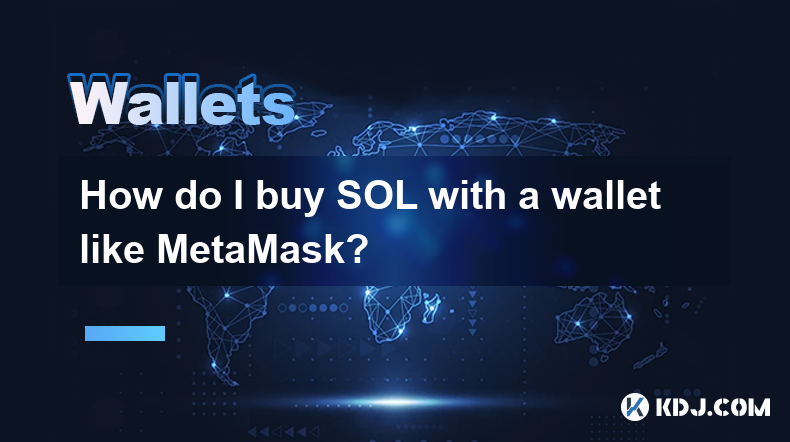
How do I buy SOL with a wallet like MetaMask?
Apr 20,2025 at 01:35pm
How do I Buy SOL with a Wallet Like MetaMask? Purchasing Solana (SOL) using a wallet like MetaMask involves a few steps, as MetaMask primarily supports Ethereum and Ethereum-based tokens. However, with the help of decentralized exchanges (DEXs) and some intermediary steps, you can acquire SOL. This article will guide you through the process in detail. S...
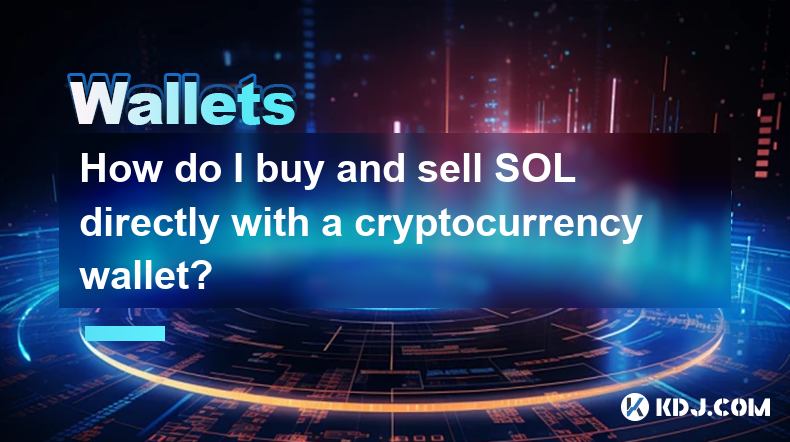
How do I buy and sell SOL directly with a cryptocurrency wallet?
Apr 19,2025 at 05:35pm
Introduction to Buying and Selling SOL with a Cryptocurrency WalletBuying and selling Solana (SOL) directly from a cryptocurrency wallet offers a convenient and secure way to manage your digital assets. Cryptocurrency wallets are essential tools for anyone looking to interact with the Solana blockchain. They allow you to store, send, and receive SOL wit...
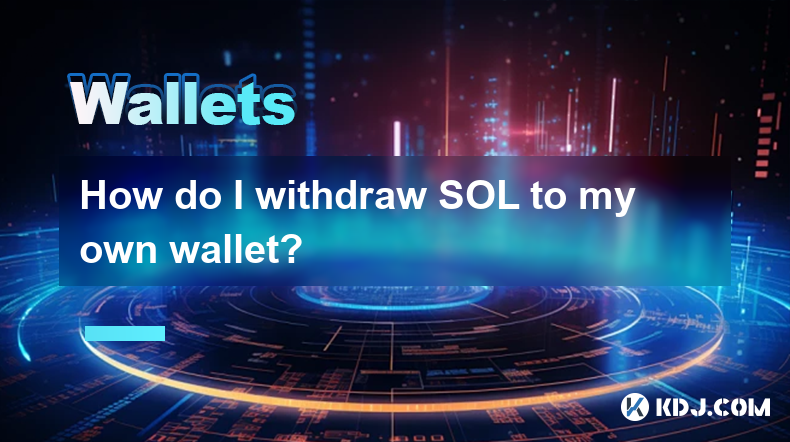
How do I withdraw SOL to my own wallet?
Apr 20,2025 at 04:21pm
Introduction to Withdrawing SOL to Your Own WalletWithdrawing Solana (SOL) to your own wallet is a straightforward process, but it requires careful attention to detail to ensure that your funds are transferred safely and efficiently. SOL is the native cryptocurrency of the Solana blockchain, known for its high throughput and low transaction fees. Whethe...
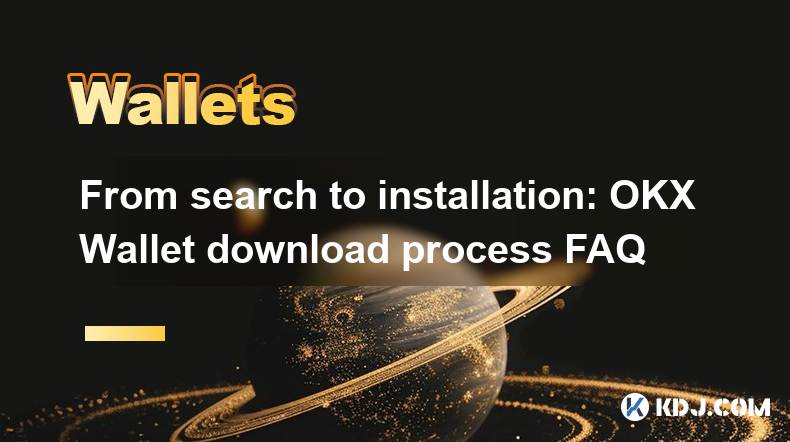
From search to installation: OKX Wallet download process FAQ
Apr 17,2025 at 02:00pm
The OKX Wallet is a popular choice among cryptocurrency enthusiasts for managing their digital assets securely and efficiently. Understanding the process from searching for the wallet to its installation can be crucial for new users. This article will guide you through the entire process, providing detailed steps and answers to frequently asked question...
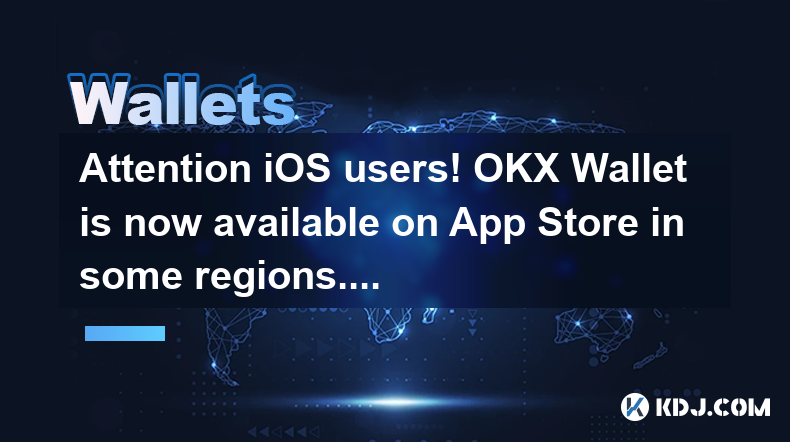
Attention iOS users! OKX Wallet is now available on App Store in some regions. How to check its availability?
Apr 20,2025 at 05:21pm
Attention iOS users! OKX Wallet is now available on App Store in some regions. If you're eager to check its availability and start using this versatile cryptocurrency wallet, follow our detailed guide. We'll walk you through the steps to confirm if OKX Wallet is accessible in your region, and provide insights into its features and benefits. Checking OKX...
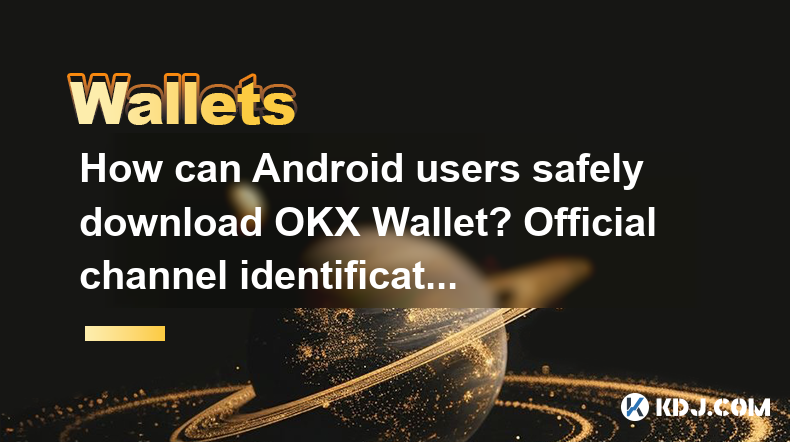
How can Android users safely download OKX Wallet? Official channel identification guide
Apr 19,2025 at 10:50pm
How can Android users safely download OKX Wallet? Official channel identification guide Ensuring the safety and security of your cryptocurrency assets begins with downloading apps from trusted sources. For Android users interested in using OKX Wallet, it's crucial to identify and use the official channels to avoid downloading malicious software. This gu...

How do I buy SOL with a wallet like MetaMask?
Apr 20,2025 at 01:35pm
How do I Buy SOL with a Wallet Like MetaMask? Purchasing Solana (SOL) using a wallet like MetaMask involves a few steps, as MetaMask primarily supports Ethereum and Ethereum-based tokens. However, with the help of decentralized exchanges (DEXs) and some intermediary steps, you can acquire SOL. This article will guide you through the process in detail. S...

How do I buy and sell SOL directly with a cryptocurrency wallet?
Apr 19,2025 at 05:35pm
Introduction to Buying and Selling SOL with a Cryptocurrency WalletBuying and selling Solana (SOL) directly from a cryptocurrency wallet offers a convenient and secure way to manage your digital assets. Cryptocurrency wallets are essential tools for anyone looking to interact with the Solana blockchain. They allow you to store, send, and receive SOL wit...

How do I withdraw SOL to my own wallet?
Apr 20,2025 at 04:21pm
Introduction to Withdrawing SOL to Your Own WalletWithdrawing Solana (SOL) to your own wallet is a straightforward process, but it requires careful attention to detail to ensure that your funds are transferred safely and efficiently. SOL is the native cryptocurrency of the Solana blockchain, known for its high throughput and low transaction fees. Whethe...

From search to installation: OKX Wallet download process FAQ
Apr 17,2025 at 02:00pm
The OKX Wallet is a popular choice among cryptocurrency enthusiasts for managing their digital assets securely and efficiently. Understanding the process from searching for the wallet to its installation can be crucial for new users. This article will guide you through the entire process, providing detailed steps and answers to frequently asked question...

Attention iOS users! OKX Wallet is now available on App Store in some regions. How to check its availability?
Apr 20,2025 at 05:21pm
Attention iOS users! OKX Wallet is now available on App Store in some regions. If you're eager to check its availability and start using this versatile cryptocurrency wallet, follow our detailed guide. We'll walk you through the steps to confirm if OKX Wallet is accessible in your region, and provide insights into its features and benefits. Checking OKX...

How can Android users safely download OKX Wallet? Official channel identification guide
Apr 19,2025 at 10:50pm
How can Android users safely download OKX Wallet? Official channel identification guide Ensuring the safety and security of your cryptocurrency assets begins with downloading apps from trusted sources. For Android users interested in using OKX Wallet, it's crucial to identify and use the official channels to avoid downloading malicious software. This gu...
See all articles





















































































